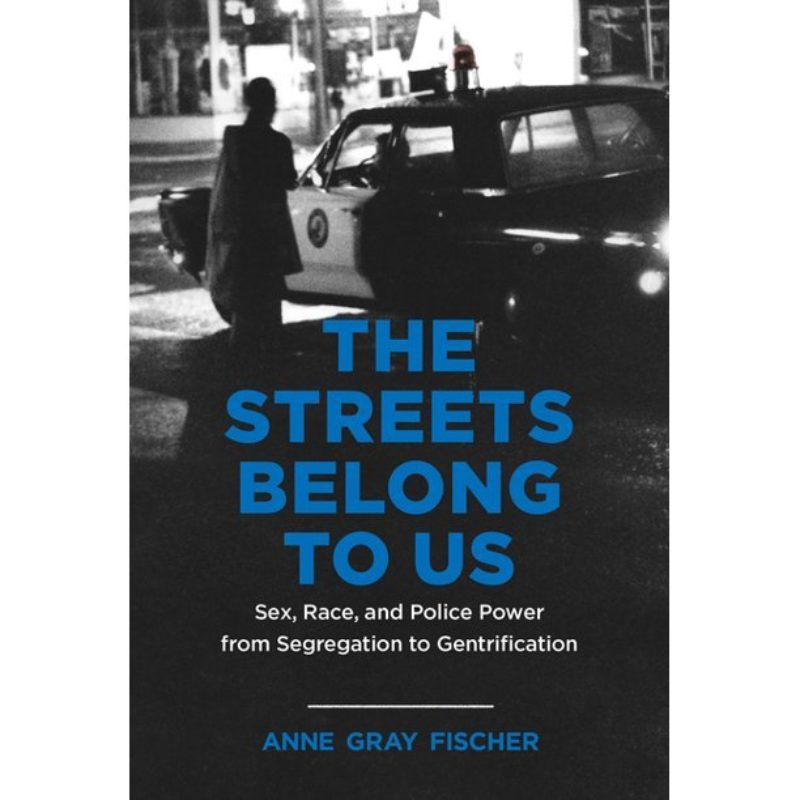An Interview with Anne Gray Fischer
October 03, 2022
Conversations in Black Freedom Studies (CBFS) is a monthly discussion series held at the Schomburg Center for Research in Black Culture. Curated by Jeanne Theoharis and Robyn Spencer with Komozi Woodard, the series was established as a space to discuss the latest scholarship in Black freedom studies, bringing the campus and community together as scholars and activists challenge the older geography, leadership, ideology, culture, and chronology of Civil Rights historiography. In anticipation of the discussion “From CPS to Dobbs to the Carceral System--What History Shows Us for Challenging Systems of Oppression Today” scheduled for October 6th, we are highlighting the scholarship of one of the guests, Anne Gray Fischer, author of The Streets Belong To Us: Sex, Race, and Police Power from Segregation to Gentrification.
Anne Gray Fischer is assistant professor of U.S. gender history at the University of Texas at Dallas. Her research and teaching focus on histories of gender, sexuality, and race; law enforcement and the state; and feminist activisms in the modern United States. She is the author of The Streets Belong to Us: Sex, Race, and Police Power from Segregation to Gentrification, a history of sexual policing between Prohibition and the rise of broken windows policing in the 1980s. Her work has been published in the Journal of American History and the Journal of Social History, as well as the Washington Post, and Boston Review, and elsewhere.
Conversations in Black Freedom Studies: What is a historical moment that you are thinking about and learning from as we navigate today's political terrain?
Anne Gray Fischer: The Democratic candidate for my state house district in Texas is currently running on two planks in her platform: she supports public safety, or “well-funded police departments,” and access to reproductive healthcare, including abortion. These two planks—for law enforcement and reproductive rights—are fundamentally in conflict. History offers one vivid illustration of the connection between police and abortion bans through the story of “abortion squads” in postwar police departments and their coordinated police campaigns to target abortion providers.
Abortion police squads in New York, Miami, San Diego, Baltimore, and other U.S. cities typically ran undercover sting operations with plainclothes policewomen posing as women seeking abortions. Even though women, as healthcare patients, were not the stated targets of abortion policing, they were absolutely punished by police, subject to surveillance, harassment, interrogation, and the shame of public exposure as abortion squad officers searched for abortion providers. Poor white women and women of color were most vulnerable to police investigation while receiving hospital care after enduring a frightening botched procedure (made more dangerous, of course, through criminalization). This campaign fell hard on Black doctors accused of performing abortions on white women—a police strategy that simultaneously criminalized Black healthcare providers, enforced white supremacist patriarchy, and restricted the reproductive autonomy of all women. Finally, the enforcement of abortion bans provided rare avenues to department advancement and promotion for white policewomen, exposing the clear ways in which women could achieve “gender equity” in law enforcement by deploying state violence against other women.
The “public safety” function of police is so often presented as discrete and unconnected from reproductive rights, but history—and this emerging moment, as journalists and researchers are documenting the ways that police and reproductive justice are fundamentally opposed—teaches us how police have served as the racist, classist, and cisheterosexist enforcement arm of bans on reproductive autonomy.
CBFS: I'd like to invite you to share about a Black feminist organization whose work you write about.
AGF: I write about Margaret Prescod’s visionary activism as co-founder of Black Women for Wages for Housework in the 1970s and Black Coalition Fighting Back Serial Murders in the 1980s and 1990s. Through both these organizations (which are only two chapters in her vibrant and ongoing justice work), Prescod insisted on valuing and materially supporting Black women’s lives and demanded that the state recognize that Black women’s lives matter.
With the Black Coalition Fighting Back Serial Murders, which pressured law enforcement authorities to reckon with the mass killings of poor Black women that terrorized Black communities in the 1970s and 1980s, Prescod advanced ways of understanding the relationship between state and interpersonal violence and how policing made Black and Latina women more vulnerable to violence in their communities. During the Reagan administration, social welfare funding was slashed while, at the same time, resources were lavished on law enforcement. Prescod argued that the state should redistribute funding away from the “wasteful futility” of policing and toward scholarships, healthcare, housing, and “other social services where women and children are hardest hit.” By centering the reproductive labor of Black women, and fighting to invest in Black women and the communities they sustain, Prescod’s work teaches us that the campaign to defund police is necessarily a Black feminist demand.
CBFS: Why is it necessary to understand the inseparability of struggles for abolition and reproductive justice?
AGF: Police are structurally more likely to restrict, rather than defend, women’s political and reproductive autonomy because policing on this land has been historically designed to enforce the foundational violence of this country: cisheteropatriarchy, settler colonialism, and racial capitalism. By design, policing has established and enforced the barriers for women to determine their own destinies and create livable futures for themselves and their loved ones. In this legal regime, battles to defend sex worker rights, gay and trans rights, and reproductive rights are linked because they exist in the same state crosshairs to target, control, and punish people’s gender, sexual, and reproductive self-determination. Police and prison abolition meets the urgent needs of this moment by drawing the connections among differently targeted and oppressed people—and illuminating the investments we share in a future built on repair and mutual care rather than violence and punishment.
